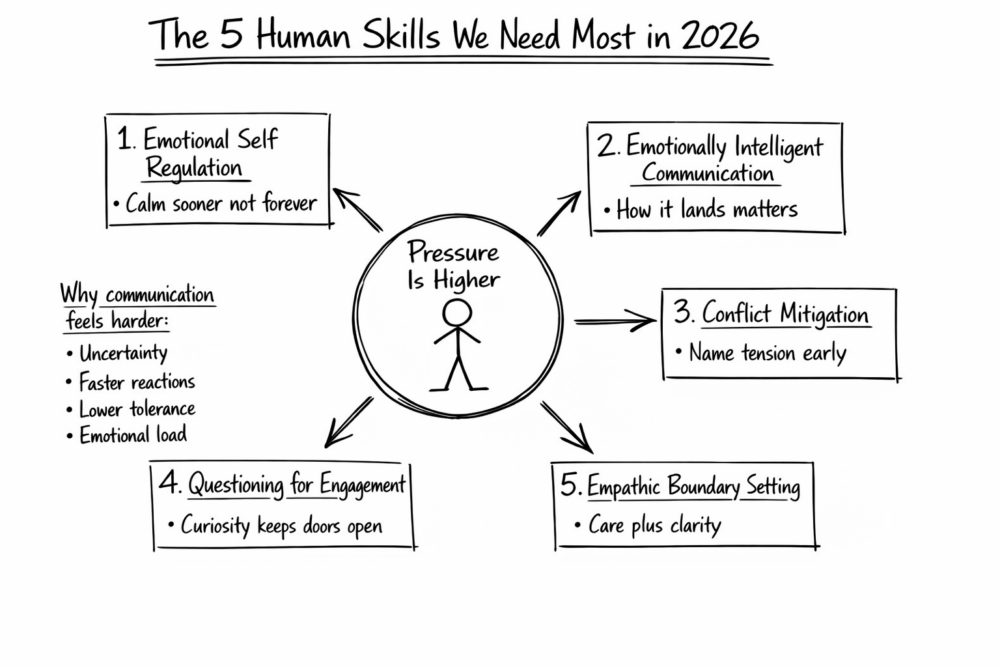Teens are turning to AI companions for connection. And not in passing.
I grew up in a time when real connection was noisy, unpredictable, and beautifully awkward. My dad used to load us into the family station wagon for what he called “mystery tours.” No GPS, no playlist, just a series of right or left turns that somehow became a family ritual. We’d drive aimlessly through neighborhoods, pointing out what we saw, laughing, making up stories – just being together. Connection was a moving target. Literally. But it was real.
Now, decades later, I’m standing in a leadership workshop when a parent pulls me aside and says something that lands like a gut punch:
“My teen’s best friend is an AI.”
She wasn’t joking. She was heartbroken. And she’s not alone.
More and more families are navigating a quiet but powerful shift. Kids and teens are bonding emotionally with chatbots like Replika, My AI on Snapchat, and Character.AI. These apps are designed to mirror warmth, humor, curiosity, and affection – and they’re working.
Teens and the Rise of AI Companions
More teens are turning to AI tools not just for entertainment, but for emotional intimacy.
According to a 2023 Pew Research study:
-
One in five teens has used an AI chatbot for emotional support.
-
Nearly half of those teens say they prefer it over talking to friends or family.
-
Snapchat’s My AI has over 150 million users.
-
Replika reports more than 10 million active users, with many referring to their bots as partners or best friends.
Why are teens choosing AI companions?
Because they never argue. They don’t interrupt. They remember preferences, mirror moods, and always validate. These apps offer emotional feedback that feels safe and predictable. They are frictionless, always available, and designed to say what you want to hear.
But that ease comes at a cost.
The Hidden Cost of Easy Connection
Human relationships are rarely smooth. Real connection involves misunderstanding, awkward silence, emotional repair, and the courage to try again. That messiness is where we learn empathy, communication, and trust.
When teens form their primary emotional bonds with bots, they are not just avoiding discomfort. They are skipping the stretch that discomfort brings – the growth.
A 2024 study in the Journal of Adolescence found teens who regularly used AI for emotional support were 30 percent less likely to seek help from real people when upset. Similar findings appear in Danish studies showing adolescent bot users report lower levels of peer support and increased loneliness
Across the U.S., more than 70 percent of teens report using AI companions at least once, and about half use them regularly. Some even say their relationship with a bot feels emotionally satisfying – findings reported by the Associated Press from a 2025 Common Sense Media survey.
We are not just raising digital natives. We are at risk of raising emotionally fragile humans.
What Can We Do About It?
Banning AI is not realistic. But helping teens practice real connection is.
In this week’s Magnetic Communication Podcast episode, I share five tools that can help rebuild emotional intelligence and communication – without lectures, punishment, or digital detoxes.
Here is a quick overview of what you’ll hear:
1. Honest Questions
Ask in a way that invites depth. These prompts build empathy and trust without pressure.
2. The EQ Switch
A four-step method to help teens pause, name their emotions, and choose a calm response. It teaches real-time emotional regulation.
3. The Mystery Tour
A low-pressure connection ritual disguised as a random car ride. Your teen picks the turns, and you both explore what you see. It’s light, it’s fun, and it opens the door to conversation.
4. The Connection Challenge
A deceptively simple daily action that strengthens real-life relationships – without needing to talk about feelings at all.
5. Show, Don’t Script
Model emotional honesty instead of perfection. When you mess up, show them how to try again. That is where trust is built.
These tools are not complicated. They are not expensive. But they work – because they are real.
If you want to understand how to use these tools in everyday life, and why they matter more than ever, listen to the full episode here!
Because if we don’t help our kids practice awkward, imperfect, in-person connection now, they may grow up thinking emotional closeness should always be easy, always polished, and always digital.
And that is not connection. That is a simulation.
Let’s bring them back to the real thing.




Love how you make difficult concepts seem simple and easy to understand 💪
This post deserves all the attention and recognition it can possibly get 🔥